Brexit trade deal: Who really owns UK fishing quotas?
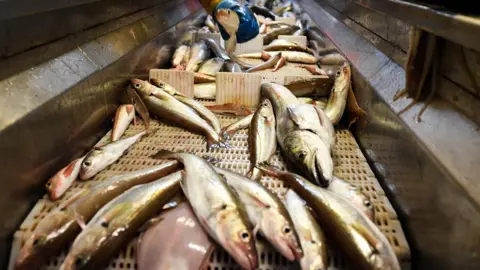 Getty Images
Getty ImagesFishing was one of the key sticking points in negotiations between the UK and the EU over their new trade agreement.
The deal, which came into force on 1 January 2021, still allows EU boats to fish in UK waters for some years to come but gives UK boats a greater share of the catch (or quota).
The question of who has the right to fish in UK waters is further complicated by the fact that significant parts of the British quota have been sold off to foreign-owned boats, which sail under a British flag.
Half of England's quota in foreign hands
£160m worth of England's fishing quota is in the hands of vessels owned by companies based in Iceland, Spain and the Netherlands, according to BBC research.
That amounts to 130,000 tonnes of fish a year and 55% of the quota's annual value in 2019.
Quotas are used by many countries to manage shared fish stocks. They determine how many fish of each species each country's fleets are allowed to catch.
The EU's Common Fisheries Policy (CFP) sets quotas among EU member states, and similar deals are negotiated with neighbouring countries.
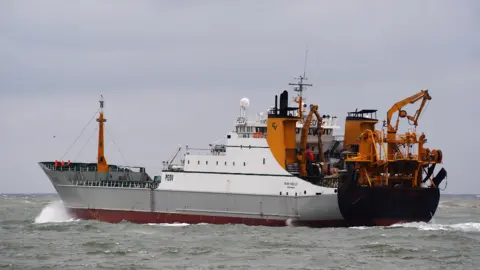 NMUIM / Alamy Stock Photo
NMUIM / Alamy Stock PhotoOne of the priorities of the Fisheries Act, which became law on 24 November, is that "fishing activities of UK fishing boats bring social or economic benefits to the United Kingdom".
Current rules say even if vessels are 100% foreign-owned, they must have an "economic link" to the UK. That means they must meet one of five conditions, which include landing more than half their catch at UK ports or having majority British crews.
A consultation by the Department for Environment and Rural Affairs (Defra), which closed in November, outlined plans to "increase the landing requirements from 50% to 70% for quota catch caught by English registered vessels landing more than 2 tonnes per annum".
The consultation stated that this change "could result in up to £60m worth of additional landings each year", but it did not mention any changes to rules around ownership.
'Legally tricky'
For many in the fishing industry Defra's proposals did not go far enough.
"If the government allows foreign companies to continue to own more than half of England's quota, it would be a calamity," said Paul Lines, from Fishing for Leave, a pro-Brexit group within the British fishing industry.
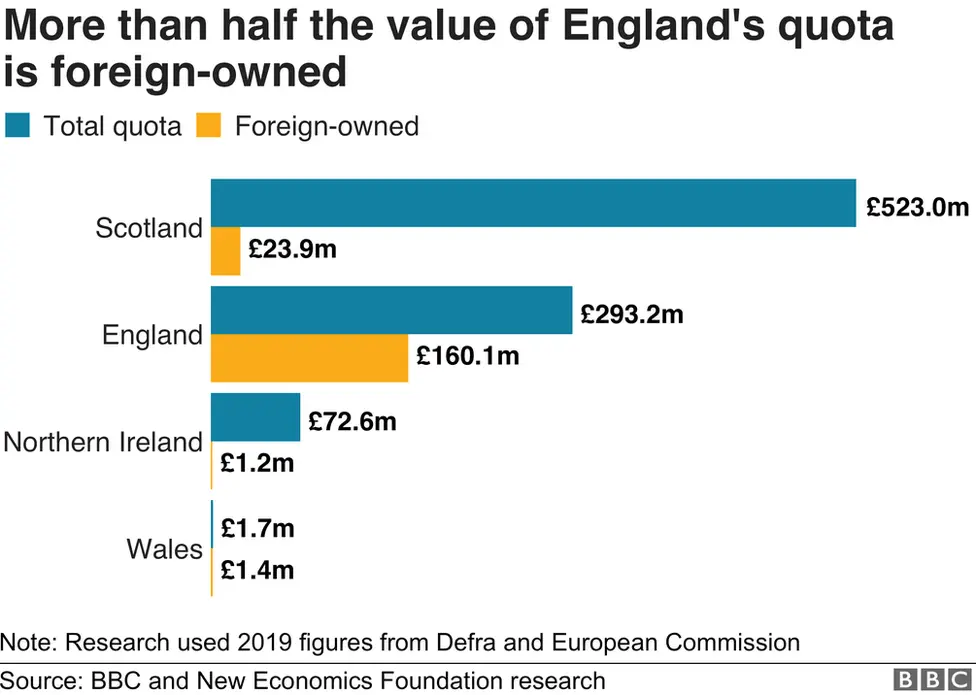
Fishing for Leave wants to change the rules so all British fishing vessels must be "60% British-owned; 60% British-crewed; (and must) land, process and sell 60% of their catches in Britain".
"I would be absolutely over the moon if they bring an end to foreign ownership," added Mr Lines, "but it would surprise me if the government followed through on this as it wasn't mentioned in the bill or in the consultation."
An EU source said British negotiators were at one point insisting that boats must be majority British-owned in order to take advantage of a larger catch in UK waters, but this proposal does not feature in the final text of the deal.
"It could be possible, though administratively difficult, for the government to re-allocate any newly-won quota to British-owned boats," says Dr Emma Cardwell from Nottingham Trent University.
"But it would be legally tricky to try and wrest existing UK quota from the ownership of foreign companies."
Why were quotas sold off?
Many parts of the quota were sold by English fishermen in the 1990s when fishing rights were cut dramatically. Cod fishing, for instance, was almost entirely stopped for several years.
Foreign companies then bought it up as a long-term investment, and experts say the quota market has been allowed to develop in an unregulated way ever since.
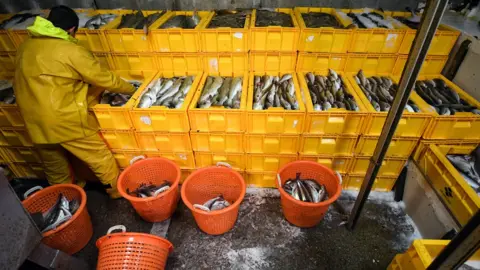 Getty Images
Getty Images"There's a lack of clarity on the legal status of fishing rights," Dr Cardwell said, "meaning the government is very vulnerable to litigation if it tries to reallocate quota.
"Any foreign fishing companies that purchased UK quota in good faith would be very likely to sue if this was now taken away from them."
Devolution makes a difference
As fishing is a devolved policy, the way the quota is managed differs around the UK.
England and Wales, where a majority voted for Brexit, have both allowed foreign ownership of more than half their fishing quota.
In Wales, which is allocated a tiny share of the UK quota, the figure is as high as 85% of the annual value - most of it held by one big industrial trawler.
But in Scotland, which is responsible for about 60% of the UK quota, only 4% of the annual value in 2019 was in foreign hands. In Northern Ireland the figure was 2%.
"The Scottish fishing industry is largely made up of family-owned businesses," said Elspeth MacDonald, from the Scottish Fishermen's Federation.
"These businesses have developed the industry during the good times and have had the desire and resolve to hold on through difficult times, when others have not."
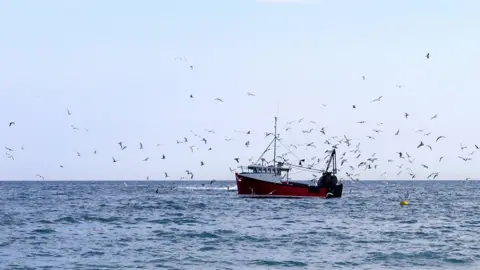 Getty Images
Getty ImagesThe figures obtained by the BBC, in collaboration with the New Economics Foundation (NEF), reveal that a fifth of the annual value of the UK's overall quota is held by foreign-owned companies. The total annual value is just over £900m.
Foreign Ownership
Elsewhere in Europe the level of foreign ownership varies.
In Belgium, the figure is just over a quarter, but other EU countries have much stricter rules.
There is very little foreign ownership in France and Ireland for example, and in two countries outside the EU that have big fishing fleets - Iceland and Norway - there is no foreign ownership at all.
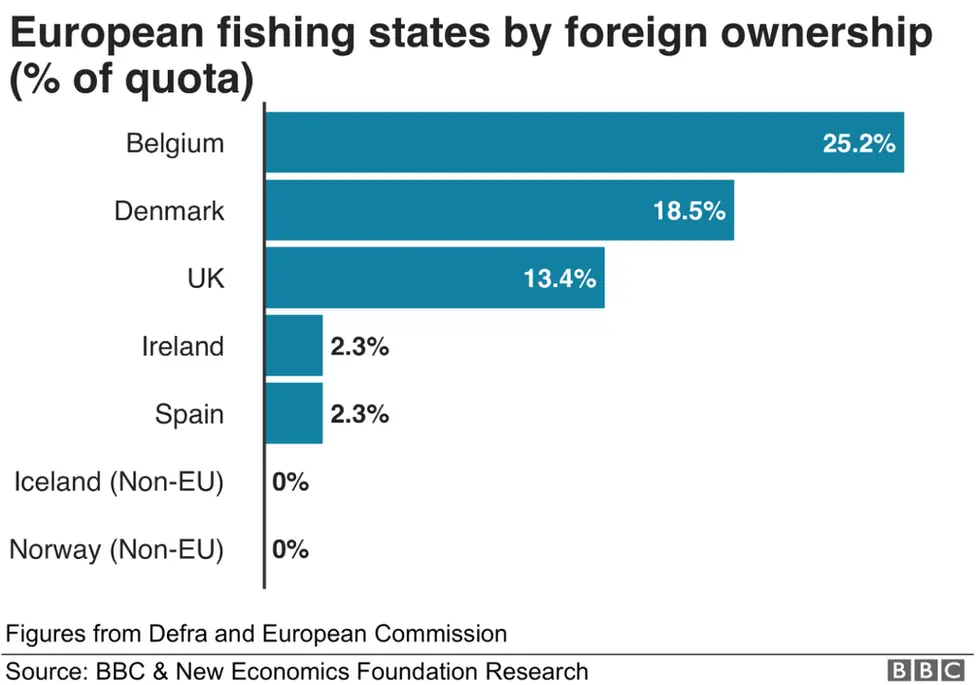
The degree of confusion over foreign ownership of UK quota was highlighted by a ministerial response to a parliamentary question back in October.
Victoria Prentis, the Fisheries Minister, admitted the Marine Management Organisation, the body responsible for English waters, "does not hold data relating to the degree of foreign investment".
This article is an update of the original version published on 16 May.



